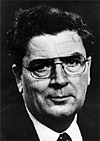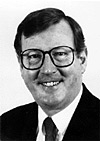Over the past thirty years, the national, religious and social conflict in Northern Ireland has cost over 3,500 people their lives. John Hume has throughout been the clearest and most consistent of Northern Ireland's political leaders in his work for a peaceful solution. The foundations of the peace agreement signed on Good Friday 1998 reflect principles which he has stood for. As the leader of the traditionally predominant party in Northern Ireland, David Trimble showed great political courage when, at a critical stage of the process, he advocated solutions which led to the peace agreement. As the head of the Northern Ireland government, he has taken the first steps towards building up the mutual confidence on which a lasting peace must be based. The Norwegian Nobel Committee also wishes to emphasise the importance of the positive contributions to the peace process made by other Northern Irish leaders, and by the governments of Great Britain, Ireland, and the United States. The Norwegian Nobel Committee expresses the hope that the foundations which have now been laid will not only lead to lasting peace in Northern Ireland, but also serve to inspire peaceful solutions to other religious, ethnic and national conflicts around the world. October 1998 Norwegian Nobel Institute Drammensveien 19, N-0255 Oslo, Norway Website: www.nobel.no (Link to be opened in new window). |
|
BOES.ORG International Campaign to Ban Landmines (ICBL) ICBL NGO-links |
Laureates 2004: Wangari Maathai. For her contribution to sustainable development, democracy and peace. She thinks globally and acts locally. 2003: Shirin Ebadi, Iran, 1947-. Lawyer and human rights activist, for her efforts for democracy and human rights. She has focused especially on the struggle for the rights of women and children. 2002: Jimmy Carter, USA, 1924-. For his decades of untiring effort to find peaceful solutions to international conflicts. 2001: The prize was divided equally between: The United Nations ( U.N.) and its Secretary-General, Kofi Annan, Ghana, 1938- For their work for a better organized and more peaceful world. 2000: Kim Dae Jung, Republic of Korea, 1925-. For his work for democracy and human rights in South Korea and in East Asia in general, and for peace and reconciliation with North Korea in particular. 1999: Doctors Without Borders (Médecins Sans Frontières) In recognition of the organisation's pioneering humanitarian work on several continents. 1998: The prize was divided equally between: John Hume, Northern Ireland, 1937-; and David Trimble, Northern Ireland, 1944-. For their efforts to find a peaceful solution to the conflict in Northern Ireland. 1997: The prize was divided equally between: International Campaign to Ban Landmines (ICBL) and Jody Williams, USA, 1950-. 1979: Mother Teresa, India, 1914-1997. Leader of the Order of the Missionaries of Charity. |
|
|

